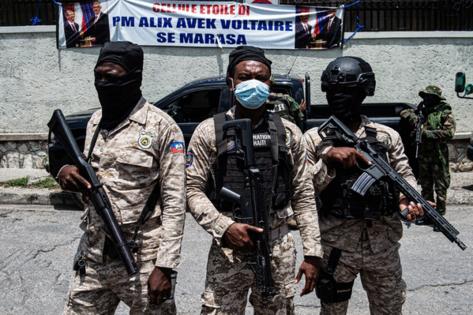State Department human rights report on Haiti omits much, but criticizes police abuses
Published in News & Features
The rising number of extrajudicial killings carried out by Haitian police is once more coming under scrutiny, this time by the U.S. State Department.
The Trump administration noted the arbitrary killing of civilians by Haitian police and government agents in its long-awaited annual assessment of human rights in 198 countries and territories. The report highlights, among other things, the case of a prosecutor who is alleged to have killed dozens of people this year, and an incident last year in which Haitian police allowed gunshot victims who were being transported by an international medical charity to be turned over to an angry mob.
The report also noted Haiti’s worsening violence by armed gangs and their expansion into previously unaffected regions, including the Artibonite and the center of the country. However, unlike in previous reports, this year’s assessment did not include a section on people who have been forced to flee their homes or whether the government has taken steps to deal with the situation, nor did it include a section on government corruption. The report also doesn’t discuss the impact the gang violence is having on access to food, education, shelter, clean water and health care, all of which are repeatedly stressed by human rights advocates in and outside of Haiti.
Quietly released last week, this year’s report was not accompanied by the usual fanfare of a public briefing by the secretary of state. Instead, it was rolled out a half-year late and “streamlined,” omitting mentions about harsh prison conditions and human rights violations targeting LGBTQ people.
Lack of accountability
Still, the report’s criticism of the role of the Haiti National Police and government agents in carrying out human-rights abuses is part of a growing concern about the lack of accountability as security forces try to wrest back control from deadly armed gangs.
“Impunity remained a significant problem” within the Haiti National Police, the report by the U.S. government, which is a leading funder of Haiti’s national police, said. “Civil society representatives alleged widespread misconduct among police officers driven largely by poor training and a lack of professionalism.”
The report’s authors heavily cite the United Nations’ reporting on the government’s failure to protect Haitians from armed gangs, and indiscriminate violence from security forces. The U.N. Integrated Office in Haiti had noted that between Jan. 1 and March 31, 2024, the police’s internal affairs office opened 31 cases involving 39 police officers accused of human rights violations. None were closed or referred for sanction, the State Department report said.
“There were credible reports of police involvement in vigilante killings throughout the year, including instances where the victims had originally been taken into police custody,” the report said, noting that such actions, part of a movement in which individuals take the law into their own hands, “included mob attacks in which targets were beaten or dismembered before being killed, sometimes by being burned alive.”
Prosecutor singled out
For the third year in a row, the State Department singled out Jean-Ernest Muscadin, the public prosecutor in the city of Miragoane, who on social media boasts that his Nippes region is a “graveyard for bandits.” According to a U.N. report published earlier this month, Muscadin claims to have killed at least 27 people suspected of gang ties between April 1 and June 30 of this year.
The numbers, the U.N. said, were among 73 extrajudicial, summary or arbitrary executions carried out during its reporting period.
According to the Boston-based Institute for Justice & Democracy, public prosecutors and police have executed at least 165 people outside the law in Haiti since 2024. The lack of meaningful investigations or accountability for such abuses, the human rights group has said, “further erodes state control and fueled a growing pattern of police and other government actors operating well beyond the law to use illegal, indiscriminate and extrajudicial force.”
William O’Neill, the U.N.’s human rights expert on Haiti, said the State Department’s annual report for 2024 correctly notes that the situation deteriorated significantly during the year.
“It pulls no punches stating that credible reports, often based on reporting by the U.N. Human Rights Office ... of unlawful killings, torture and attacks on journalists characterized the year. Especially noteworthy was acknowledging the credible reports of police involvement in vigilante killings,” he said. “Yet impunity reigns as the report notes since no cases of human rights violations by police officers were referred for sanction by the Inspector General’s office.”
Earlier this summer, U.N. Human Rights Chief Volker Türk, warning that the human rights crisis in Haiti has plummeted to a new low as gangs continue to carry out killings, rapes and kidnappings, and extrajudicial killings by security forces grow, called for violators to be held accountable.
“Any use of lethal force by law enforcement officers should always be in accordance with human rights law, and abide by the principles of legality, necessity, proportionality, non-discrimination, precaution and accountability,” he said.
“It is essential that the authorities live up to their agreement to address all crimes, including sexual violence and financial crimes such as corruption. The specialized judicial task forces should be established as soon as possible,” Türk added.
While Haitians are increasingly frustrated by the escalation in violence by armed gangs, concerns are growing among human rights groups that law enforcement itself is failing to police its officers. Ahead of the publication of the State Department human rights report, Haiti’s transition government named a new police chief — the third in two years — who has since named a new high command for the force.
_____
©2025 Miami Herald. Visit miamiherald.com. Distributed by Tribune Content Agency, LLC.







Comments